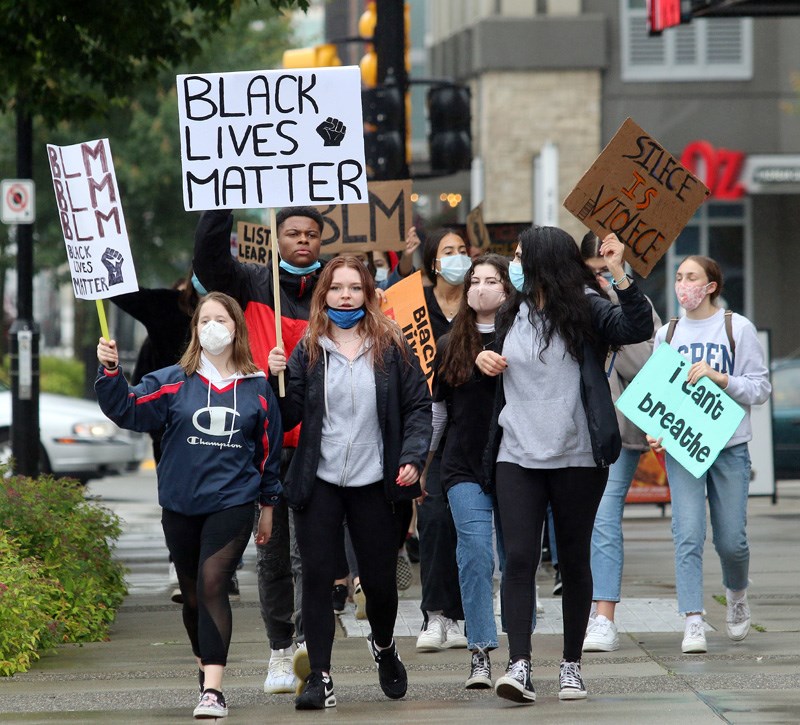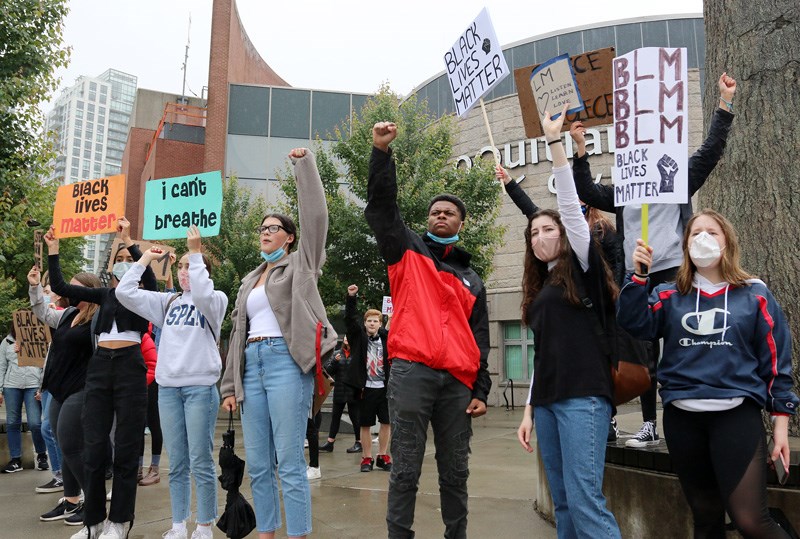A Coquitlam councillor is calling for the RCMP to review its policies around hate speech following a string of police incidents across the country and ongoing protests against the killing of George Floyd, the Black man who died May 25 after a Minneapolis police officer kneeled on his neck for nearly nine minutes through pleas of “I can’t breathe.”
Coun. Trish Mandewo, who chairs Coquitlam’s Multiculturalism Advisory Committee and is herself a Black woman, said the protests have exposed long-standing wounds in racialized communities across the world, and that now is the time to put pressure on both the federal and provincial government to audit the RCMP’s policies around hate crimes and ensure procedural justice is carried out.
“Defund the police? My answer is absolutely, no. Is there a need for change? Absolutely,” Mandewo said, days after a protest drew thousands to the streets of Vancouver in solidarity with a global protest movement that began as a push against police brutality and has evolved into a groundswell to end institutional racism.
And while the councillor admits she can’t do much from her municipal position, Mandewo is calling on Coquitlam council to put pressure on the Union of British Columbia Municipalities (UBCM) and the Federation of Canadian Municipalities (FCM) to lobby the provincial and federal governments for change.
“We need to use all the channels that we can to put pressure on,” she said.
Mandewo says she regularly receives reports of racial abuse from people across the Tri-Cities and that many of those incidents go unanswered because people assume nothing is going to get done.
In one incident last year, a coach for a minor hockey team went on a rant in a WhatsApp group, uttering racist slurs against Black people, said Mandewo.
“They have a Black family in there and nobody in the group stood up,” she said.
When Mandewo called Coquitlam RCMP, officers said there was nothing they could do because there was no direct threat to an individual.
“I’m in the community and I’m saying the reports are there. There’s a disconnect there. If there was a folder that was opened and they followed up, that would stop some people,” she said. “I would love for [the RCMP] to have a line to report hate crimes, a dedicated line where [victims] can say, ‘this is what happened to me.’”
Mandewo said she has never heard reports of anyone who has been targeted by Coquitlam RCMP because of their skin colour or ethnicity. But nationally, it’s not hard to point to a number of cases, like the recent shooting death of Chantel Moore, a Tla-o-qui-aht Indigenous woman from Vancouver Island who died at the hands of police shortly after moving to New Brunswick to be closer to her five-year-old daughter.
“How many cases like that have happened? What is it that they need to do to change that narrative?” asked Mandewo.
“The RCMP as a whole needs to look at that. What if one of those officers that has his own biases were to come here? It can shift just like that.”

As George Floyd was laid to rest beside his mother in Houston Tuesday, the last eight minutes and fifty-three seconds of his life continue to reverberate through a movement that seeks more than police reform.
“People are united this time around. With videos now available, there’s evidence. It’s not us against them. It’s more, ‘here’s the evidence, here’s what’s happened,’” said Mandewo.
“Suddenly, everything is being put into perspective and people understand it for what it is.”
“We have the diversity in the Tri-Cities. What’s lacking is inclusion,” said Mandewo.
When Mandewo’s 16-year-old daughter, Alexandra first saw Floyd gasping for air, it quickly became personal.
“These are black men and any one of these guys could have been my own father,” she said, pointing to the string of killings in recent weeks and a childhood bouncing between Coquitlam and Oklahoma. “Imagine what those families are going through. It could have been me.”
For the younger Mandewo, who had already steeped herself in questions of race as a member of Pinetree secondary’s Anti-Racism Club, this moment prompted her to reflect on how “things like this have been going on since the beginning of colonialism, slavery, segregation, apartheid. It never ends,” she said.
At the same time, Alexandra said the swell of protest has been an affirmation that “Black people will be put through these trials and rise above together.”
Many of her friends — Black, Latino, white and Iranian — attended the protests in Vancouver last weekend, and again in a home-grown march Tuesday, which began at Port Coquitlam city hall and snaked up Shaughnessy Street, along Lougheed Highway and towards Coquitlam city hall.
Lara Kawasme, who began organizing the march last week through social media, said she wanted to give people a chance to speak up here in the Tri-Cities and “let people know it’s a serious problem.”
Through light drizzle, the crowd of young people — mostly women — chanted “No peace. No justice” to the sound of honking cars.
“A lot of people say it doesn’t happen in Canada, but we see it,” said Brianna Brill, another Grade 10 student at Riverside secondary, who said she wanted to use her “white privilege” to become more of a voice for other people.
“We’ve all got to talk about these things and think about their actions.”
— with files from Mario Bartel



